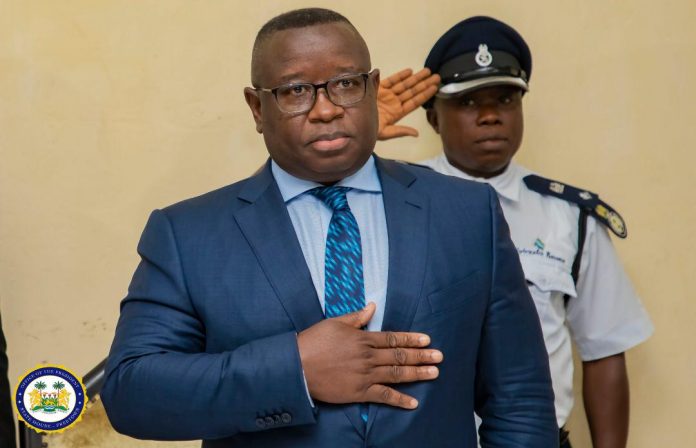By Amin Kef Sesay
Since it was reported that the British Prime Minister, Boris Johnson, has proven positive of contracting the coronavirus his health continues to deteriorate. Currently he is said to have been hospitalized. As a way of expressing compassion and empathy with his health situation, President of Sierra Leone, Julius Maada Bio on Tuesday 7th April 2020 sent him a consolation Message of “Speedy Recovery” which reads: “At these difficult times for our countries, our thoughts and prayers for speedy recovery are with you, Prime Minister Boris Johnson, your family and the people of the United Kingdom”
Up to yesterday, the 7th April 2020, a Senior Cabinet Member, Michael Gove, confirmed that he has been receiving oxygen treatment in an Intensive Care Unit.
The Cabinet Minister, Michael Gove, said that the Prime Minister was “not on a ventilator” but had “received oxygen support.”
He informed that Johnson was “receiving the very best care” at St. Thomas’ Hospital in London, after being taken into intensive care at 7 p.m. on Monday.
“And of course, one of the reasons for being in intensive care is to make sure that whatever support the medical team consider to be appropriate can be provided,” Gove said.
Gove later said he was self-isolating at home because a member of his family was showing coronavirus symptoms. Gove said on Twitter that he was not displaying any symptoms and is continuing to work. He’s the latest in a long line of British Government Ministers and advisers to be forced into isolation.
Johnson’s hospitalization has highlighted the lack of a formal line of succession in the UK Government. Johnson, 55, nominated the Foreign Secretary, Dominic Raab, who also holds the title of First Secretary of State, to Deputize for him “where necessary.” But there is no official Deputy recognized by UK law or the country’s largely unwritten constitution.
Few formal powers are invested specifically in the UK Prime Minister and key decisions are taken collectively by the Cabinet or its sub-committees. Many statutory powers are held by individual Secretaries of State. But in recent decades, holders of the UK’s top political office have adopted a more presidential style, and the sweeping nature of the ruling Conservative Party’s most recent election victory was attributed to Johnson’s personal appeal with voters.
“The Prime Minister has a team around him who ensure the work of Government goes on,” Gove revealed. He said Johnson had a “stripped-back diary” last week to make sure he could follow the medical advice of his doctors.
Gove confirmed that Raab was now in charge of seeing through Johnson’s plan to tackle the novel coronavirus. “Dominic [Raab] takes on the responsibilities of chairing the various meetings the PM would’ve chaired but we’re all working together to implement the plan that the PM has set out,” he said.
Conservative MP Tobias Ellwood, who chairs the House of Commons defense select committee, tweeted good wishes to Johnson but added: “It is important to have 100% clarity as to where responsibility for UK national security decisions now lies. We must anticipate adversaries attempting to exploit any perceived weakness.”
Johnson was taken to hospital on Sunday evening. At the time, Downing Street said the decision was a precaution because he continued to suffer from a cough and a fever ten days after testing positive for the coronavirus. But his condition deteriorated on Monday, Downing Street said, and he was moved to the intensive care unit at St. Thomas’ Hospital.
The coroavirus has hit the top of the British Government hard. The Health Secretary, Matt Hancock, said on March 27 that he had the virus, on the same day that the Chief Medical Officer, Chris Whitty, announced that he would begin self-isolation after displaying Covid-19 symptoms. Neil Ferguson, a top UK Government adviser on the virus, said on March 18 he believed he had been infected. Various other senior Government Ministers and advisers have been forced to self-isolate.





